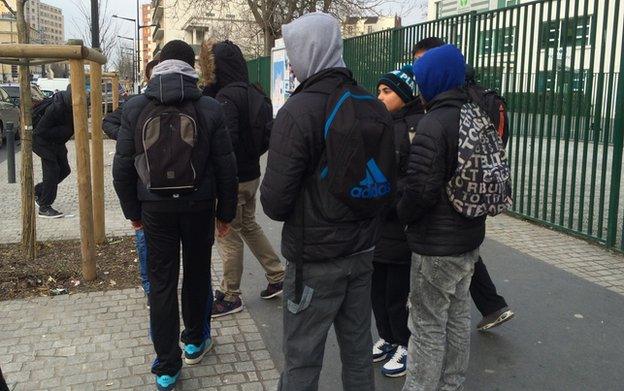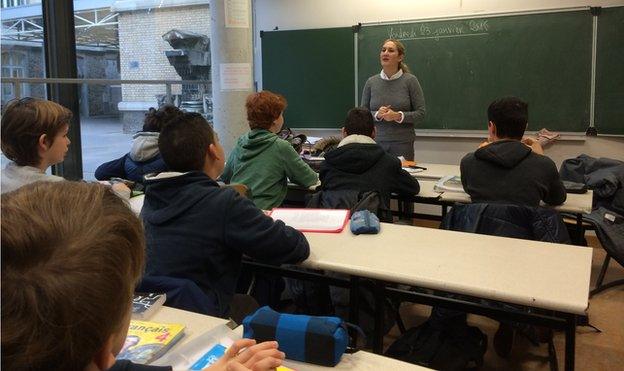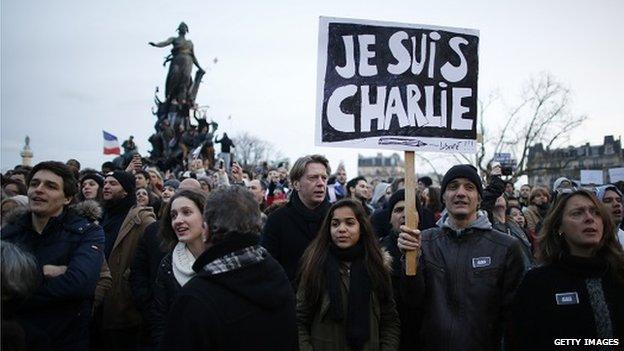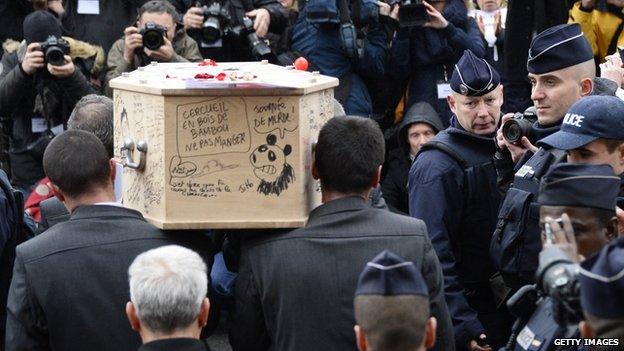Charlie Hebdo attack: French values challenged in schools
- Published

The overwhelming majority of pupils in Saint-Denis come from migrant families
Karim, from Saint-Denis, just north of Paris, does not believe the official account of the attack on the satirical magazine Charlie Hebdo.
Twelve people died when two brothers, Said and Cherif Kouachi, fired on the journalists on 7 January. Five others were killed over the two following days by one of their associates.
"I don't know who did this, but they are not Muslims," says the 18-year-old, standing outside his school.
One of his friends finds it "deeply suspicious" that Said Kouachi should leave his identity card in the car.
Such doubts are rife among the Muslim teenagers living in the deprived "banlieues" (suburbs) around French cities. "Of course it was staged," scoffs Lydia, 17, who goes to school in Argenteuil, east of Paris. "All my friends know that."
Who did the staging? Lydia suspects some right-wingers within the government bent on discrediting Muslims - something they have achieved: "Now people look at you as if you were a terrorist."
The killing of prominent journalists united the country in defence of free expression, under the rallying cry "Je suis Charlie". But such unity was not in evidence in the institution where such core values of the French Republic have traditionally been forged - the school system.
'Didn't mean much'
In middle-class suburbs, provincial towns, and affluent city centres across France most students embraced the "Je suis Charlie" message.
"It was very spontaneous," says Constance, who teaches literature in the eastern city of Dijon. Arriving in class a day after the attack, she found her students making signs reading "Let ink flow, not blood", in preparation for an impromptu street rally. "They asked me if I had adhesive tape for the banners," she recalls.
History teacher Iannis Roder teaches mostly Muslim pupils: "Just a minority of them were very sad about what occurred."
Things went differently in Saint-Denis, one of the poorest suburbs of Paris.
Iannis Roder, who teaches history to predominantly immigrant pupils there, says most were unconcerned. "Twelve people were killed," he says. "It didn't mean much to them."
Some did express shock because Islam is peaceful. "They don't react in the name of universal values, but in the name of their religion," Mr Roder says.
There are youths in Saint-Denis who feel strongly about the right to offend religion, but theirs is not the prevailing voice there.
This does not mean that most children of immigrant origin are impervious to France's republican values and the Enlightenment ideas that underpin them. It does mean, however, that in Saint-Denis and elsewhere, those ideals and values will be frequently challenged in class.
Explain the reasons
The education authorities have been aware of this for years. An official 2004 report warned that for some pupils the word "jihadist" had a heroic connotation - a fact confirmed by several teachers interviewed for this report.
In 2012, after seven people were killed in the southern cities of Toulouse and Montauban by a radical Islamist who targeted soldiers and Jews, many pupils refused to observe the minute's silence declared in schools - with a small number expressing support for the gunman.

Gabrielle Derameaux was alarmed when some of her students blamed intelligence services for the killings
After the Charlie Hebdo killings, the education ministry was not taking any chances. Every school was instructed to make time on the eve of the moment of silence to explain the reasons for it.
Although disruptions were recorded in many places, the strategy did yield results. History teacher Iannis Roder says there were far fewer incidents during the minute's silence at his school in Saint-Denis than in 2012.
The minute's silence for Charlie Hebdo "would have been impossible without prior discussion", says Marie, a literature teacher in one of the better secondary schools in the area. The tears she was unable to hold back also helped pupils understand the seriousness of the occasion.
Conspiracy theories
Marie says that her school's good results in a high-immigration area are the fruit of years of engagement with pupils. However an ability to think on her feet clearly helps.
When a student recycled one of the Charlie Hebdo conspiracy theories swirling around the internet in class, she turned it into an object lesson on fact-checking and source analysis. Marie says the message got through: "The next time a conspiracy theory was brought up, they all said: 'What are your sources?'"

Millions of people took part in unity marches across France in the wake of the attacks
Mr Roder's technique is to confront any objectionable remark, including homophobic or anti-Semitic prejudice. "I will not let anything go unchallenged," he said. "And it works. The kids respect you when you stand up to them because it shows you care."
For some, however, the tough-love approach is not an option. "We are on the front line," a history teacher in Saint-Denis says. "Sometimes it's best to pretend you haven't heard."

"More recently, a boy mimicked the killings in a corridor"

If teachers in Saint-Denis were braced for the challenges posed by the Charlie Hebdo killings, elsewhere many were caught by surprise.
Anne works at a school in a quiet, mixed area west of Paris. Many of her pupils come from upwardly-mobile migrant families who have escaped nearby housing estates. She says she has a "wonderful relationship" with the children, and was "completely unprepared" for their response.
"It hit me in the guts," she says. "I heard: 'They [the journalists] got what was coming to them. You do not mock the Prophet.'" Only the Muslim pupils - about a third of the class - spoke. Others did not say a word.
"On the Thursday my pupils did observe the minute's silence, but I did not feel it was out of respect for the victims - it was out of respect for me," Anne notes. Her colleagues who have less authority over their own class did not even try to observe it.

Cartoonist Bernard "Tignous" Verlhac was buried in a coffin covered in drawings
A few days later, she had a further shock when she found the "Je suis Charlie" poster she had put up in the hallway of the school torn down and spat on.
In another incident at her school, a pupil was recently caught re-enacting the massacre, shouting "Allahu Akbar" and mimicking the firing of a Kalashnikov.
A similar incident occurred at another school visited for this report - and located in a salubrious city centre. These are no doubt adolescent provocations, but they have a chilling effect in a country that is the largest provider of European jihadists in Iraq and Syria.
Increasingly sensitive
Xavier, a history teacher in a mixed neighbourhood near the Charlie Hebdo offices, also heard comments along "they-were-asking-for-it" lines, but dismisses these as "bluster". Most of his students, including many immigrants, attended the "Je suis Charlie" march at the nearby Place de la Republique, he stresses.
But Gabrielle Derameaux says the sought-after secondary school in a plush part of Paris where she teaches literature does face serious challenges. She was alarmed when some pupils who had never shown any sign of radicalism blamed intelligence services for the Charlie Hebdo killings.
"They were defiant," she says. "I represented the official version, and they had access to a hidden truth."

Wednesday 7 January - Two masked gunmen enter Charlie Hebdo offices, killing 11 people, including the magazine's editor. Shortly after the attack, the gunmen kill a police officer nearby
Thursday 8 January - A lone gunman shoots dead policewoman Clarissa Jean-Philippe and injures a man in Montrouge, in the south of Paris. Gunman later identified as Amedy Coulibaly.
Friday 9 January - Police stand-off with Kouachi brothers at an industrial building in at Dammartin-en-Goele, 35km (22 miles) from Paris ends with their deaths. Coulibaly reappears and takes several people hostage at a kosher supermarket in eastern Paris. He kills four - Yoav Hattab, Yohan Cohen, Philippe Braham and Francois-Michel Saada - before being shot dead by police.
Sunday 11 January - Huge crowds take part in Marche de la Republique in Paris to show unity after the attacks

More generally, Ms Derameaux says, it is becoming difficult for teachers to tackle religion. "When mentioning the Bible as part of the course on the Ancients, you also have to talk about the Koran, which is not on the official curriculum." If she failed to do so, she says, the class would be disrupted.
In her course on the Song of Roland, an epic based on Charlemagne's victory over the Saracens, Ms Derameaux takes care to depict the latter as a great civilisation, as many pupils identify with the defeated Muslims.
A senior official in the education ministry acknowledges that tackling religion is a challenge for many teachers. A crash seminar on the subject was speedily organised in the aftermath of the Charlie Hebdo shootings, at the request of philosophy teachers.
.jpg)
People laid tributes outside the Charlie Hebdo offices where gunmen killed 12
The official points out that pupils of all religions - not just Islam - are becoming increasingly sensitive. This seems borne out by a visit to one of Ms Derameaux' classes. Almost half of her 13 to 15-year-olds - including Jews, Muslims and Christians - felt that Charlie Hebdo should not have been allowed to caricature Muhammad.
None sought to justify the attack, but clearly the message at the heart of the "Je suis Charlie" movement - in defence of free expression and secularism - does not appear to have been been fully absorbed.
For many French teachers, the Charlie Hebdo attack has brought home a disturbing fact: some of the principles that have forged French identity no longer go without saying.
"I had to hammer home the principles of the republic," says Esther, a literature teacher in a middle-class area east of Paris. "I realised that the basic notions of tolerance and freedom of expression are not so obvious to our students."
Across the country teachers are waging an ideological battle they thought had been won a century ago. In an age that combines new digital technology and old religious fervour, some are not sure they are winning.